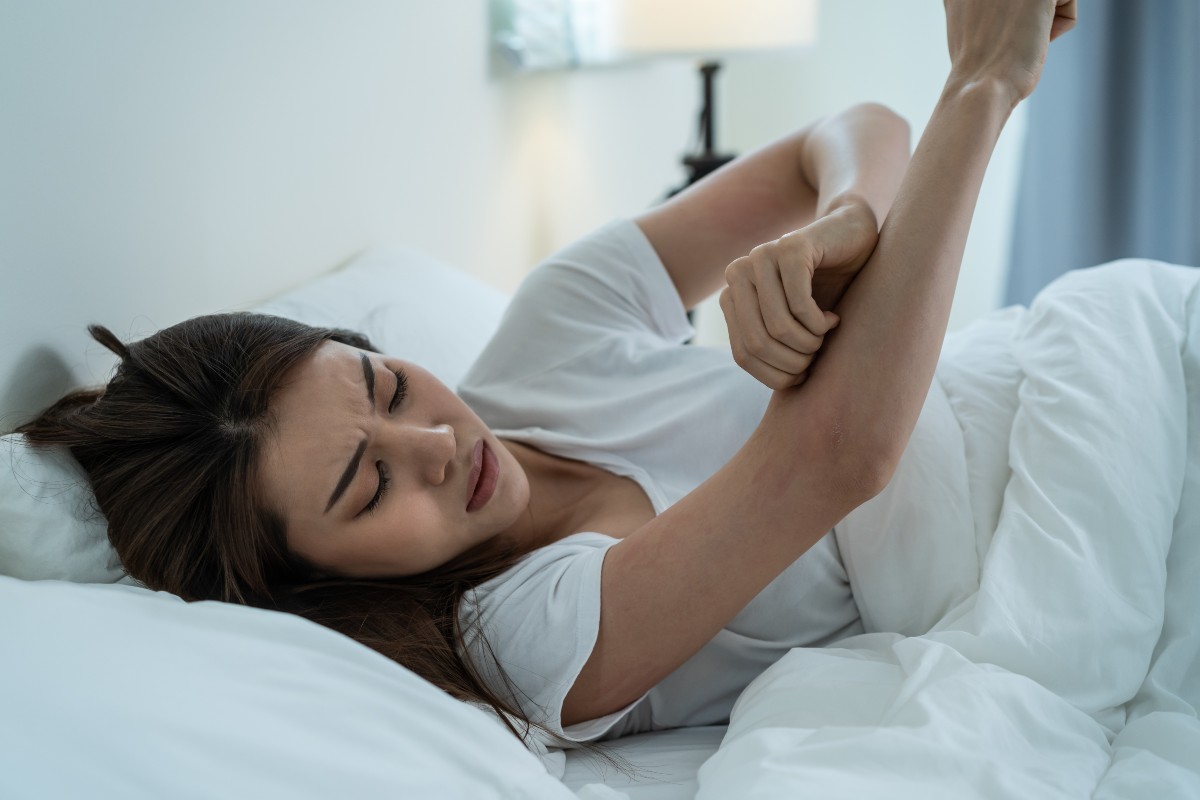
Why Do I Get Itchy in Bed?
There’s nothing worse than settling into bed, ready for a good night’s sleep, only to be plagued by relentless itching. If you find yourself scratching more at night, you’re not alone. There are several possible reasons why this might be happening, and thankfully, most of them have simple solutions.
Let’s explore some common causes of nighttime itchiness and what you can do about it.
1. Dry skin
Cooler temperatures, central heating, and harsh soaps can all strip moisture from your skin, making it feel dry and itchy—especially at night when your body temperature naturally rises.
Solution: Apply a fragrance-free moisturiser before bed and use a humidifier in your room to add moisture to the air (1).
2. Allergies and dust mites
Your bed is a paradise for dust mites—microscopic creatures that thrive in warm, humid environments and feed on dead skin cells. Their droppings can trigger allergies, leading to itching, sneezing, and congestion.
Solution: Wash your bedding weekly in hot water, invest in hypoallergenic bedtime essentials, and vacuum your mattress regularly.
3. Fabric sensitivities
Certain fabrics and detergents can irritate sensitive skin. Synthetic materials like polyester can trap heat and sweat, while scented detergents or fabric softeners may cause allergic reactions.
Solution: Look for breathable, natural fibres like cotton or bamboo, and use a hypoallergenic, fragrance-free detergent.
4. Bed bugs
Nobody wants to think about bed bugs, but these tiny pests can leave you covered in itchy bites. If you wake up with red, clustered bite marks (especially on exposed skin), bed bugs could be the culprit.
Solution: Inspect your mattress and bed frame for small brown spots or tiny bugs. If you suspect an infestation, wash all bedding on high heat and call a pest control professional.
5. Eczema or skin conditions
Skin conditions like eczema, psoriasis, or hives can become more aggravated at night due to increased body temperature and less daytime distraction (2).
Solution: Keep your bedroom cool, wear loose-fitting pyjamas, and use gentle skincare products suited for your condition.
6. Restless legs syndrome (RLS)
Restless Legs Syndrome (RLS) is a neurological disorder that causes uncomfortable sensations in the legs, often described as itching, tingling, or a crawling feeling. These sensations typically worsen in the evening or at night when you’re resting, leading to disrupted sleep.
Solution: Regular exercise, reducing caffeine and alcohol intake, and stretching before bed can help alleviate symptoms. If RLS persists, speak to a doctor about possible treatments or medications.
7. Stress and anxiety
Believe it or not, stress and anxiety can contribute to nighttime itchiness. When you’re tense, your body releases certain chemicals that can make itching worse (3).
Solution: Try relaxation techniques before bed, like deep breathing, meditation, or a warm bath with oatmeal (4).
8. Nighttime histamine release
Your body’s natural circadian rhythm affects histamine production, which can increase in the evening and lead to itching (5).
Solution: If this is a regular issue, consult a doctor about taking an antihistamine before bed to help reduce symptoms.
Itching at night: final thoughts
If bedtime itchiness is ruining your sleep, don’t ignore it! Identifying the cause is the first step to finding relief. With a few simple changes to your daily routine or lifestyle—like switching laundry detergents, keeping your skin hydrated, or addressing potential allergens—you can enjoy a peaceful, itch-free night. And if the problem persists, a visit to the doctor might be the best next step.
Sources:

Gemma Henry - Content Lead
Gemma finds sleep fascinating and describes the discovery aspect of her role as eye-opening. Her keen eye for detail and dedication to thorough research ensures that Bensons customers get the informative sleep-based advice they're looking for.